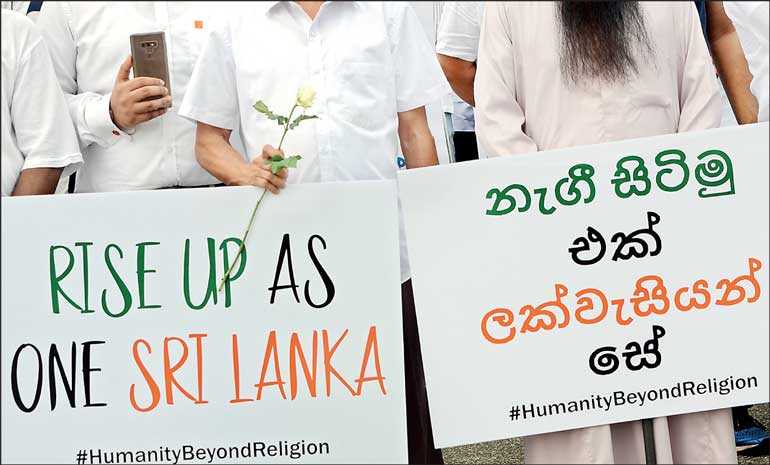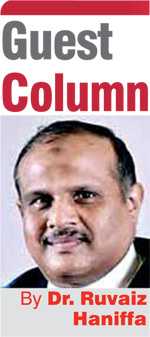Tuesday Feb 17, 2026
Tuesday Feb 17, 2026
Saturday, 13 March 2021 00:04 - - {{hitsCtrl.values.hits}}

Since the Easter Sunday carnage of 2019, what have we as Sri Lankans done to bring justice to the victims? What have we done to punish the perpetrators and the puppet masters of this crime? What lessons have we learned to come together as true Sri Lankans and move to create a more inclusive and tolerant future for all of us? – Pic by Shehan Gunasekara
 This year, 2021, Easter Sunday falls on 4 April. Two years ago, in 2019, it fell on 21 April. All of you who are reading this will recall exactly where you were and what you were doing on that fateful day in 2019.
This year, 2021, Easter Sunday falls on 4 April. Two years ago, in 2019, it fell on 21 April. All of you who are reading this will recall exactly where you were and what you were doing on that fateful day in 2019.
Easter Sunday 2019 was such an impactful day that it came to define us as individuals, families, communities, nations and humanity itself. In brief it not only showed the world the best of humanity and worst of humanity but to this day continues to do so. It is also the type of day that all of us will remember forever and pass on to our children and grandchildren as a lesson in life.
The carnage which took place on that day should never be forgotten and nerve should be allowed to be forgotten for any reason. The remembrance of this day should be dedicated to the memory of the victims of this heinous terrorist crime and equally to survivors of it and most of all dedicated to the loved ones of those who lost their lives on that day who have to live every single day with only memories.
Whatever the background and circumstances which led to this terrorist act let us acknowledge and accept one thing which is indisputable. The Easter Sunday 2019 act of terrorism was carried out by a group of misguided Sri Lankan Muslims.
It is my opinion that the ideological, political, and social infrastructure which gave rise to the Easter Sunday Carnage of 2019 is still not only existing but thriving in Sri Lanka thanks to identity politics of the majority Sinhalese and minority Muslim communities. Politicians to clergy and all in between will exploit this situation for their individual expectations and agendas at the cost of all peace-loving Sri Lankans.
Whither justice?
Since the Easter Sunday carnage of 2019, what have we as Sri Lankans done to bring justice to the victims? What have we done to punish the perpetrators and the puppet masters of this crime? What lessons have we learned to come together as true Sri Lankans and move to create a more inclusive and tolerant future for all of us? I am not qualified to answer these questions, though I have tried to initiate some action towards answering the last through my call for the Government to declare ‘A Year of Tolerance’ since June/July 2019.
There have of course been reams of paper-based reports produced which documents, analyses and recommends what the writers of these reports thought happened and what the writes think ought to happen. I sincerely hope future generations will know what really happened.
What really ought to happen is we Sri Lankans should find ways and means to accept each other for who we are and learn to live in a tolerant inclusive democracy which treats all Sri Lankans equally while recognising that we are indeed racially, culturally, religiously, politically and ideologically different from one another. We should find ways to appreciate this diversity but at the same time unite as one – E Pluribus Unum (Out of Many One). One of many fundamental ways of creating one out of many is to plan and create an environment of Tolerance among all Sri Lankans. It is in this context that I renew my call on the government to seriously consider declaring ‘A Year of Tolerance’ at its earliest convenience.
The concept of tolerance
The concept of tolerance one must understand is not a natural state for humans. It is an attitude and virtue which needs to be cultivated. Research shows that tolerance helps governments maintain law and order and exercise power effectively.
Let me summarise in a few sentences the questions which Sri Lanka will need to address in convincing the majority Sinhalese the need for tolerance. It will indeed be fair for any Sinhalese Sri Lankan Buddhist to ask, ‘Why should we Sinhalese tolerate the Muslims and Tamils? We have tolerated them for thousands of years and see what they have done and continue to do to us? Why can't the Tamils and Muslims tolerate us, the majority Sinhalese of this country; after all we are indeed the dominant race, religion and ethnicity in Sri Lanka?’
It is precisely this dialogue which we need to have as Sri Lankans. We may have different ethnic, religious, regional, cultural social and political views but what ought to be uniting us is the common denominator all of us share – Our Sri Lankan identity. This may I cite as first the justification for declaring ‘A Year of Tolerance’.
I am sure there are much more technically competent experts in the field of tolerance from a sociological perspective but let me share 6 practices and attitudes which captures the spirit of tolerance: Empathy, compassion, dialogue, conflict resolution, resilience, teamwork.
Most of these I believe are already part of our diverse religious teachings and cultural practices as Sri Lankans, but for some reason our moral compass has been disrupted by religious, political and ethnic extremist from all sides for personal, political and economic advantage.
Lord Buddha said we need to follow the middle path, and I believe that is precisely what we should do and the most important justification for calling on the Sri Lankan Government and Sinhala Buddhist majority to support the call for declaring ‘A Year of Tolerance’ for Sri Lanka.
Liberal democracy is rooted in the rights of individuals, and not the rights of groups or fixed communities. It is this theoretical background which leads people in liberal democracies to believe how they want to believe what they want to believe when they want to believe in it. This belief mechanism is rooted in the psychological theory called the 5 Enemies of Rational Thought, which are: Informal Fallacy, Formal Fallacy, Cognitive Bias, Cognitive Distortion, Self-Deception. (Reference: https://www.psychologytoday.com/us/blog/hide-and-seek/201811/the-five-enemis-rational-thought - By Neel Burton, MD)
Reality is always different to theory and in keeping with that reality the above mentioned five enemies of rational thought will always be exploited to prevent the right thing being done at the right time for the right reason. More importantly these five enemies of rational thought will always be used to justify and do the wrong thing, for the wrong time at the wrong reason.
National identity
Liberal democracy cannot exist without a national identity that defines what citizens hold in common with one another. Given the de facto multiculturalism of contemporary democracies, that identity needs to be civic or creedal. It needs to be based on liberal political ideas that are accessible to people of different cultural backgrounds rather than on fixed characteristics such as race, ethnicity, or religion – Francis Fukuyama
Human beings have a fundamental need to belong—a need that their collective identities, be they racial, ethnic, religious, regional, or national, often satisfy. Such affiliations, which psychologists call “social identities,” serve multiple psychological functions. These include, for example, the need for a sense of safety, which social identities satisfy by reducing uncertainty and providing norms that help people navigate everyday life. At times, identities provide a sense of purpose and meaning and a basis for esteem and regard that is larger than people’s individual selves. Identities efficiently satisfy the human need for respect and dignity.
I believe identity, in the recent past, has begun to focus on the rise of right-wing nationalist populism or vice versa. This development threatens liberal democracy because populist leaders seek to use the legitimacy they gain from democratic elections to undermine liberal institutions such as courts, the media, and impartial bureaucracies which minorities rely on for a sense of equity and all citizens rely on for fairplay.
We in Sri Lanka have an unparalleled and unique opportunity to exploit. With the election of the populist SLPP which used identify politics of the majority (thus reverse engineering the traditional interpretation of identity politics often associated with politically marginalised minority groups) to establish a politically stable governing environment, the state should use this platform to solidify liberal democracy in Sri Lanka by working towards creating a national identity that defines what citizens hold in common with one another. Not doing so at this point of time will lead to a situation of identity politics going on steroids!
I conclude by once again quoting Fukuyama who warns that ‘fragmenting into segments based on ever-narrower identities, threatens the possibility of deliberation and collective action by society as a whole’. If we go done the current path of identity-based politics, we in Sri Lanka are most likely to fulfil this prophecy.
People will never stop thinking about themselves and their societies in terms identities. But people’s identities are neither fixed nor necessarily given by birth. Identity can be used to divide, but it can also be used to unify. That, in the end, will be the remedy for the populist politics of the present.
We need a national level effort and programme to address these issues in a Sri Lankan manner and I firmly believe that a State-led declaration of ‘A Year of Tolerance’ will be a good starting point and foundation to use identity as a tool to unite all Sri Lankans to become one, out of many.
Dear reader, please consider extending your considerable influence as a Sri Lankan towards calling on the Government to declare ‘A Year of Tolerance’ at its earliest possible convenience.
(The writer is a Consultant Family Physician.)